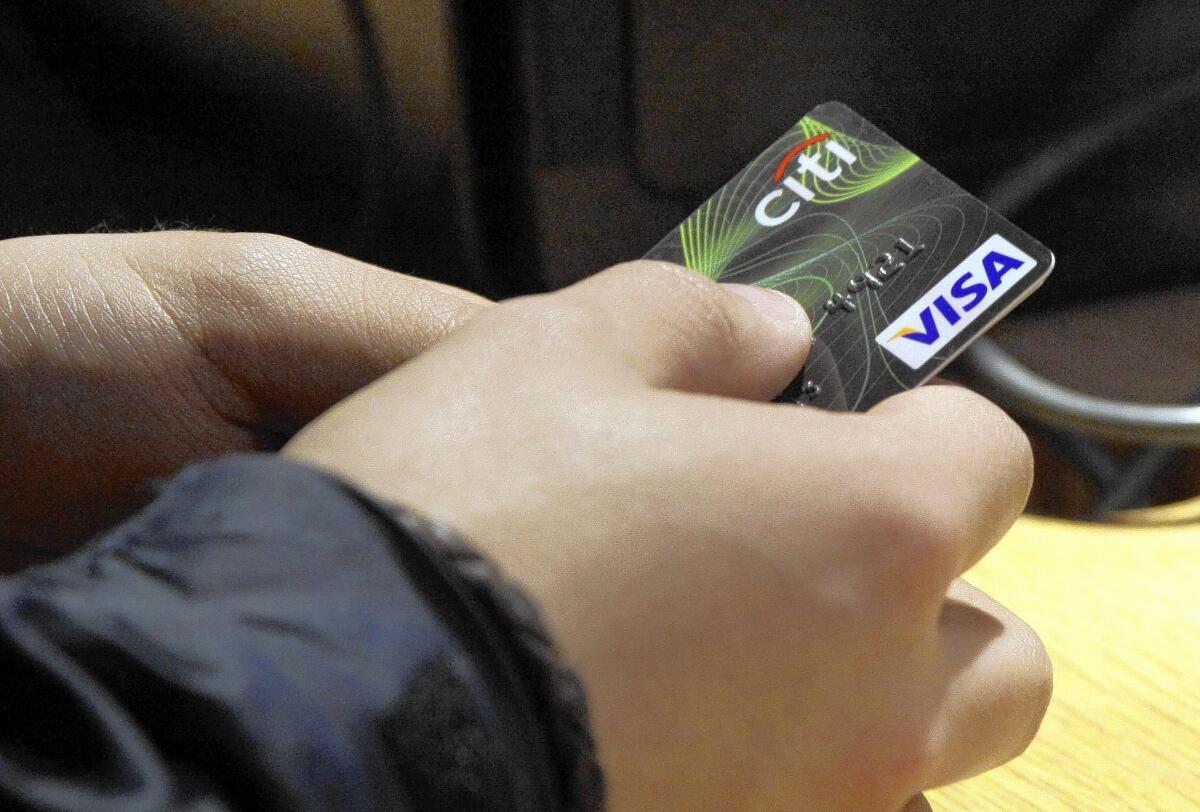How asking for a credit limit increase can help your credit score

- Share via
Dear Liz: Does requesting a credit limit increase on a credit card affect your credit score in any way?
Answer: Such a request can result in a hard inquiry on your credit reports, which can slightly ding your scores. If you get the increase, though, that usually has a positive effect on your scores.
Credit scoring formulas, including those developed by FICO and VantageScore, are sensitive to how much of your available credit you’re using. That’s especially true on revolving accounts, such as credit cards. The less of your available credit you use, the better: 30% or less is good, 20% or less is better, 10% or less is best.
It’s important to keep your balances low relative to your limits even if you pay those balances in full every month (as you should). The balances that are reported to the credit bureaus, and used in calculating your scores, are typically your statement balances. If those amounts are high relative to your credit limits, your scores probably will suffer, even if you pay that balance off immediately.
People keep their credit utilization low in a number of ways. They can spread their purchases across a number of cards, make more than one payment every month (typically one right before the statement closing date, and another before the due date) or ask for credit limit increases. Any of those actions can help increase the gap between the credit they’re using and their available credit, which can help their scores.
Keeping a bequest from doing harm
Dear Liz: I am leaving a good friend a bequest in my will. He receives government benefits, including disability, Supplemental Security Income and Medi-Cal (California’s version of Medicaid). I am beginning to be concerned that if he inherits the money, it could mess him up more than help him. Is there a way to leave someone like my friend a bequest without jeopardizing the various benefits they now receive?
Answer: You’ll want an attorney experienced in “special needs trusts” to help you put language into your estate plan that can help shelter this money and protect your friend’s benefits.
Your concern is well founded because a direct inheritance could cause him to lose income and health coverage. SSI and Medi-Cal are both “means tested” programs that require people to have less than $2,000 in assets. All too often, well-meaning friends and relatives leave direct bequests that have the unintended consequence of separating the recipients from vital services they need to survive.
Sorting out the ex’s benefits
Dear Liz: I am 68 and plan to delay starting Social Security until I’m 70. I was married for 15 years prior to an amicable divorce 15 years ago. My ex just turned 60 and remains unmarried but may possibly marry at some future time. Does she qualify for survivor benefits? If so, what can I do to help ensure that she can efficiently apply for that benefit? We have already reviewed her option to assume my benefit upon my demise, but our benefits are virtually at identical levels and so that option does not seem applicable.
Answer: You seem to have confused divorced survivor benefits with divorced spousal benefits. She may well be eligible for both, but the only way you can help her get survivor benefits is to die. It’s great that you two are still friends, but that may be taking friendship a little too far.
Your ex is too young to claim a divorced spousal benefit, which isn’t available until she turns 62. She wouldn’t be able to get the full amount, which is 50% of your benefit at your full retirement age, until she reaches her own full retirement age. If she was born in 1959, then her full retirement age is 66 years and 10 months.
Furthermore, she would get a divorced spousal benefit only if that’s larger than her own benefit. If your benefits are “virtually identical,” that’s not likely to be the case.
If you should keel over tomorrow, though, she would be eligible to receive a divorced survivor benefit and put off receiving her own. Survivor benefits are available starting at age 60, or age 50 if the survivor is disabled, or at any age if the survivor cares for the dead person’s child who is under 16. Your ex also could marry at 60 or older without losing her survivor benefit. People who receive divorced spousal benefits, on the other hand, lose that benefit if they remarry.
Liz Weston, Certified Financial Planner®, is a personal finance columnist for NerdWallet. Questions may be sent to her at 3940 Laurel Canyon, No. 238, Studio City, CA 91604, or by using the “Contact” form at asklizweston.com.
More to Read
Inside the business of entertainment
The Wide Shot brings you news, analysis and insights on everything from streaming wars to production — and what it all means for the future.
You may occasionally receive promotional content from the Los Angeles Times.










